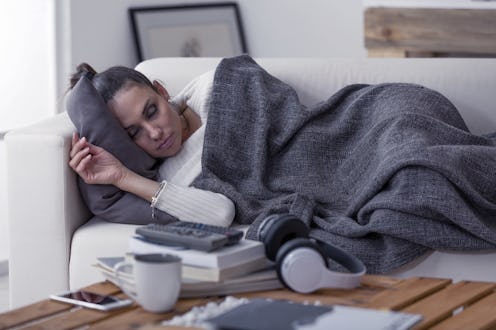Life
6 Mistakes You’re Making When Napping
Some people live for their daily naps. After all, they can be rejuvenating and the perfect break during an exhausting day. But if you're just plopping on the couch and sleeping until you see fit, you may not be doing it right. There are a number of mistakes you can make when napping, and although they might seem harmless, they can leave you feeling groggy and low-energy and even affect your sleep schedule later on. Naps can be a healthy part of your day, but it's important you follow a few simple rules.
Sleep depends on quality just as much as quantity, and it's important to be aware of the different phases of sleep as well. "There is deep sleep and light sleep, and our bodies go through cycles of this every night — about every 90 minutes," psychiatrist and sleep medicine specialist Dr. Alex Dimitriu tells Bustle. "Not all naps are equal, because depending on the timing of the nap, we may have more light sleep or deep sleep. Longer naps tend to bring us into deeper sleep, from which it can be harder to wake up."
If you want to make the most out of your naps and wake up feeling refreshed, try to avoid these six common mistakes.
1Sleeping Too Long
A one hour nap might feel nice in the moment, but it can leave you feeling more tired than you began. "A 30-minute period (or less) is best," Dr. W. Chris Winter, MD, sleep specialist and author of The Sleep Solution: Why Your Sleep Is Broken and How To Fix It, tells Bustle. "This will keep you from going into too deep of a sleep, which often creates grogginess afterward."
2Napping Too Late In The Day
It's best to avoid naps in the evening or even past 2 or 3 p.m., as this can impair your nighttime sleep or cause insomnia. This can lead to daytime fatigue later on if you're not getting enough sleep at night, which can create a vicious cycle. "Naps in the morning tend to add to our previous night," says Winter. "Naps in the evening tend to subtract from our upcoming sleep."
3Napping Whenever You Feel Like It
Just as you should try to maintain a consistent sleep schedule at night, you should aim to have a regular nap schedule as well. Napping on a schedule allows your brain to anticipate and prepare for the sleep. "It's pretty unusual for the question, 'When do you sleep at night?' to be met with the response, 'Oh, whenever...it varies all the time,'" says Winter. "Most people have a plan whether or not they stick to it perfectly. We should nap with a plan, and that is when we should aim to snooze."
4Napping In A Noisy Environment
Creating a good nap environment is also important when you decide to take a little snooze. "As lovely as the [commute] home might be, this noisy, uncomfortable and warm train car is not the best place for rest," says Winter. "Choose a place that is quiet, cool and comfortable. Take your shoes off. Fully recline. Find a cozy blanket and only use it during this rest period. Consider some lavender spray or a warm cup of chamomile prior to the event."
5Not Getting Up For Awhile After
How you finish off your nap matters just as much as the nap itself. "Awakening from a nap and then proceeding to go downstairs to your dark basement, stretch out on the couch, and doze more is not healthy," says Winter. "Naps should end in a way that your brain understands that sleep is over and wakefulness needs to be optimized. Go outside into the sunlight and take a little walk. That exercise and full spectrum light will reinforce to your brain that it need to be awake by reducing melatonin and enhancing serotonin in your brain. Doing this over time will dramatically reduce that grogginess some can feel after a nap."
6Try To Force Sleep
You don't have to judge the success or failure of your nap by the sole measure of achieving unconsciousness. "It is nothing short of amazing how good you can feel by simply resting for a period of time during the day," says Winter. "Do not ever 'try' to sleep. This plan often backfires. Release yourself of any expectation other than closing your eyes, relaxing your body, and enjoying a period of time where you do not have to do anything or be anywhere. If sleep happens, great. If it doesn't, you have still succeeded."
While there's nothing wrong with dozing off for a bit, be conscious of these six mistakes before you take a nap.
